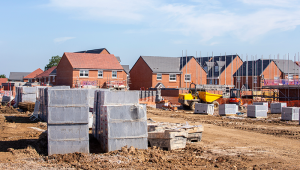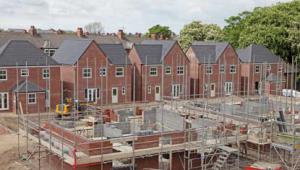
Jonathan Pearson
Over a decade of budget cuts to local planning departments contributed to just 19% of major projects being decided in the recommended 13 weeks according to the latest government figures, compared with 60% in 2012.
Needless to say, this has been holding back the development of affordable homes for some time and forcing social housing providers to slow down their much-needed housebuilding efforts. The country’s biggest providers tell me that their largest schemes now typically take several years to start delivering units. And any delays put these developments at risk of being built altogether if they are unable to keep up with rising costs or meeting funding deadlines.
This slow-down is backed up by National Housing Federation figures showing a 22% drop in the number of affordable home starts in the year to March 2024. In the capital, the Greater London Authority has said this decline was as high as 90%.
Planning reform
Labour’s shadow cabinet had long promised to address the housing crisis and, just days after winning a majority in July’s general election, the UK’s new chancellor, Rachel Reeves, announced a suite of reforms to help tackle the delays in the planning system.
This includes funding for 300 new planning officers, which is so important because local authorities cannot begin to turn around some of the problems in the planning system until they have more capacity to support their communities’ needs.
Some reports estimate that as few as one in 10 council planning departments is now fully staffed, with a Local Government Association survey from two years ago finding that over half of local authorities were struggling to hire enough planners, higher than for any other profession.
A Royal Town Planning Institute survey of Welsh planners from last year also found that those working for local authorities felt overstretched “several or more times a week”, compared with “only occasionally” for those working for private consultancies.
The strain on planning departments and officers has resulted in often unmanageable workloads, leaving too many professionals overworked and under pressure. And this understandably has caused many to jump ship for the more favourable working conditions and pay often promised by some private planning firms.
In the south west, Mid Devon District Council has said it has had to hire temporary workers to tackle a backlog of applications after its last remaining planning officer quit their role earlier this year. Wiltshire Council, one of the country’s biggest planning authorities, has announced a £1m investment in its planning department to recruit more officers and speed up decision-making there.
So, while the new planning reforms and funding for more planners is a welcome development after years of government inaction, they are but a first step toward solving what has become a deeply entrenched problem. The real test will be in how the many measures are implemented and whether they can spur on the broader systemic changes needed.
Coming together as a collective voice
But what could housing associations themselves do while we wait for the impact of Labour’s planned reforms to come into effect?
One solution to help ease much of the delays and uncertainty could lie in housing providers coming together to drive through their individual applications using one collective voice, perhaps by funding their own in-house independent planner who only deals with affordable housing applications.
If housing association groups like the Northern Housing Consortium and the Consortium of Housing Associations in the South East worked together on such initiatives in their local areas, this could help to build their collective case and influence while navigating some of the possible bureaucratic challenges in their way more swiftly.
For the UK to meet its affordable housing needs more effectively, a holistic approach involving more recruitment, retention, funding and the coming together of providers and developers clearly must be adopted. Only through comprehensive reforms and a new approach can we hope to address the root causes of the planning system’s inefficiencies and build a foundation for a more sustainable and equitable future in housing.












